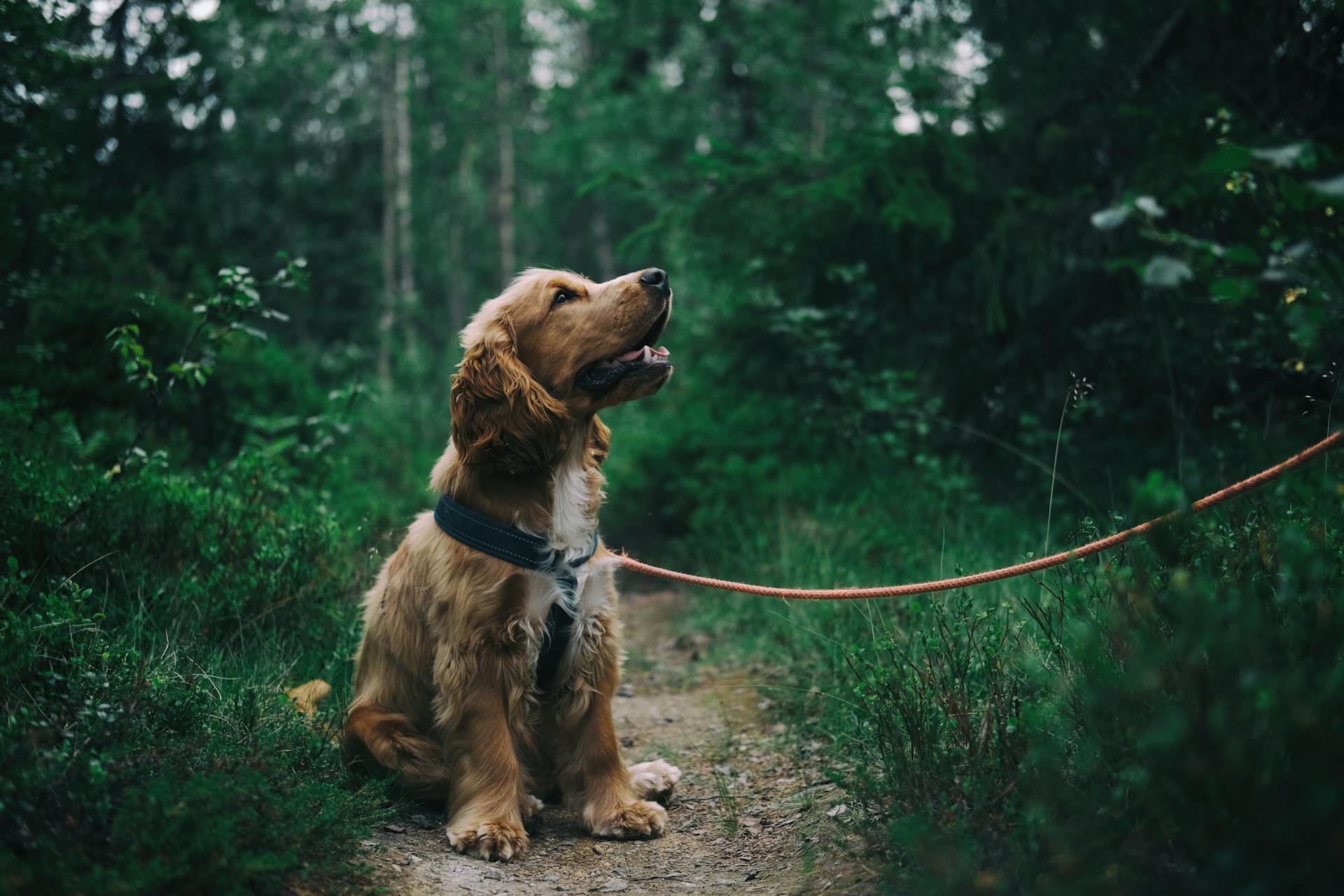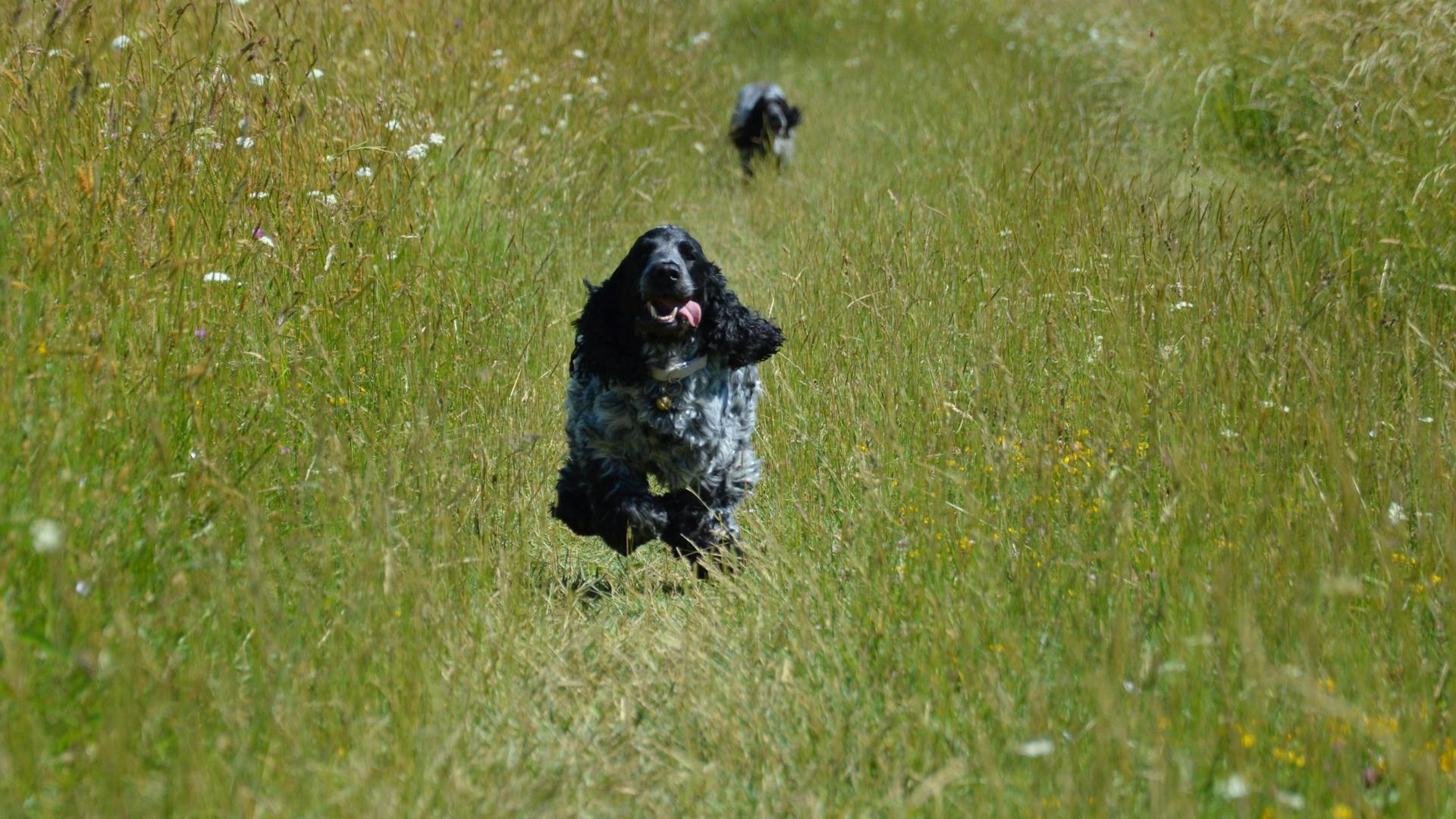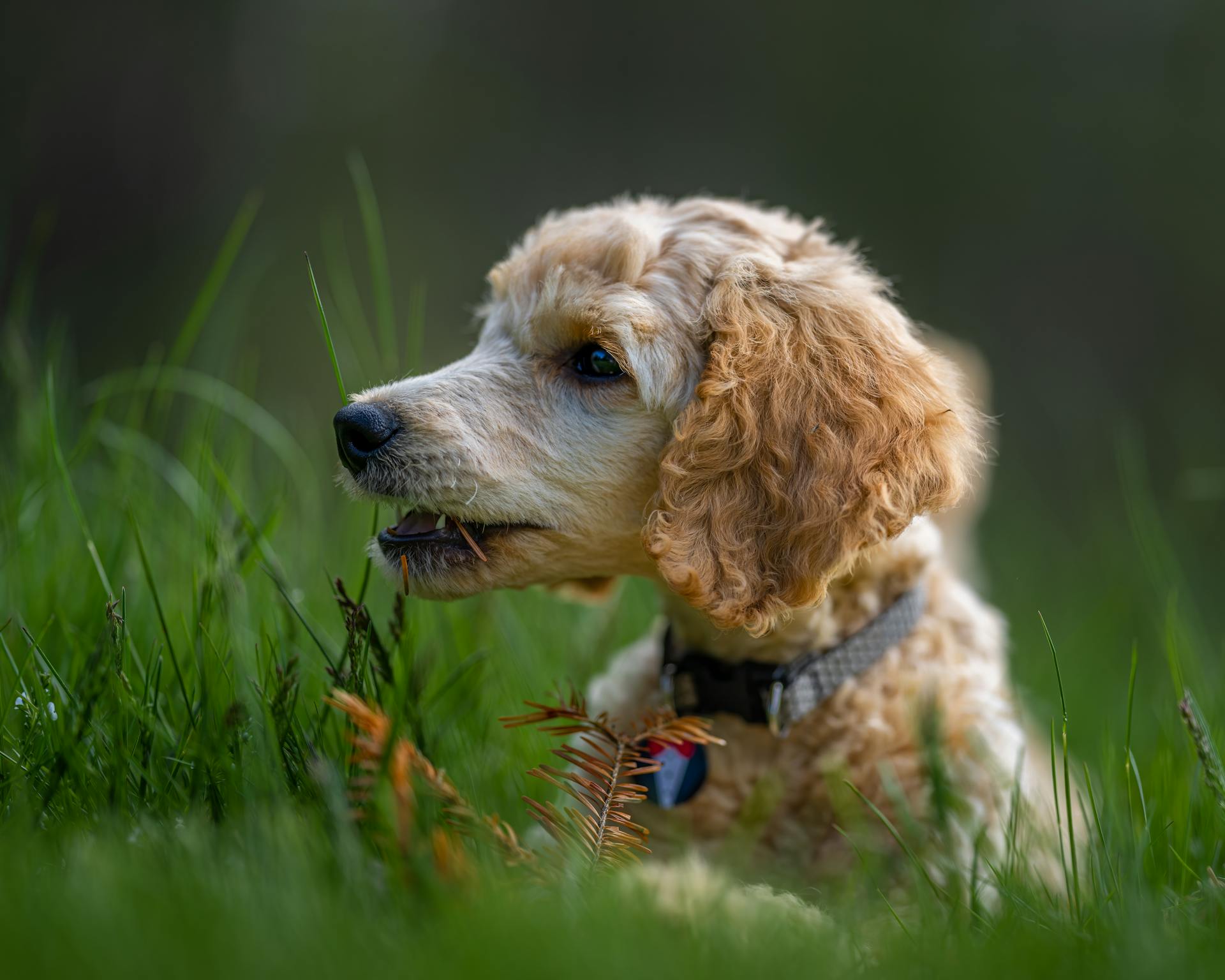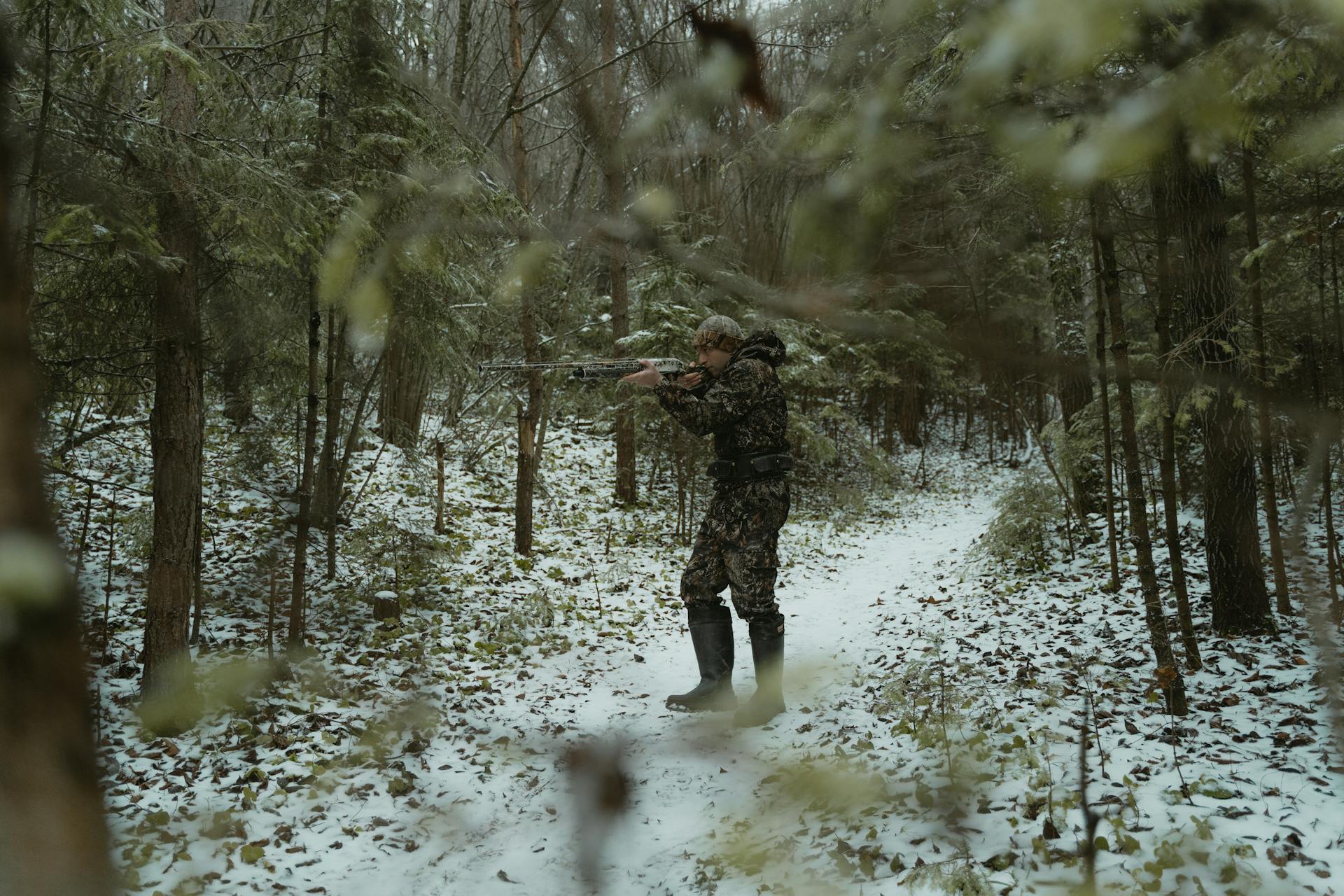
They are a versatile breed, originally bred to hunt small game like woodcock and other upland birds.
Their strong instinct to follow a scent makes them excellent working dogs.
In terms of exercise, they require regular physical activity to stay happy and healthy, with a daily need for at least 1-2 hours of exercise.
This can include walks, runs, and playtime in a securely fenced area.
A fresh viewpoint: How Much Exercise Do Labrador Retrievers Need
Companion Gundogs
Companion Gundogs are known for their love of human companionship, but Working cockers can be a bit too clingy due to their field demands.
They'll often jump up from beside your feet to join you whenever you get up, whether it's to answer the door or visit the bathroom.
If you like your space, a cocker might not be the best fit for you, as they crave attention 24/7.
Working cockers require a lot of supervision outdoors when game is present due to their incredible instincts.
On the other hand, show type cockers are more likely to walk alongside you and ignore distractions like a hopping bunny in the distance.
Even show bred cockers can benefit from basic gundog training, which will not only provide exercise but also strengthen your bond by working together.
Health and Care
As a responsible owner of a working English Cocker Spaniel, it's essential to be aware of the potential health issues that can affect your furry friend. Eye problems are a concern for Cockers, and can manifest in various ways, including progressive retinal atrophy, leading to blindness.
Cockers are also prone to autoimmune hemolytic anemia (AIHA), a condition where the dog's immune system attacks its own blood cells. Symptoms include pale gums, fatigue, jaundice, and an enlarged liver.
To prevent these conditions, it's crucial to choose a puppy from healthy parents. Look for breeders who have health tested their dogs for conditions like hip dysplasia and PRA blindness.
Here are some common health issues affecting Cockers:
- Eye problems: progressive retinal atrophy, cataracts, glaucoma, and other abnormalities
- Autoimmune hemolytic anemia (AIHA)
- Hypothyroidism
- Primary seborrhea
- Allergies: food, contact, and inhalant allergies
- Idiopathic epilepsy
- Canine hip dysplasia
- Patellar luxation
Regular veterinary check-ups and monitoring your dog's health can help prevent or detect these conditions early on.
Cocker Spaniel Health
Cocker Spaniels can be generally healthy, but they're susceptible to certain conditions and diseases. Eye problems are a major concern, and can manifest in various ways, including progressive retinal atrophy, leading to blindness; cataracts, causing a cloudy film over the eye; glaucoma, which results from increased eye pressure; and other eye abnormalities.
For your interest: Eye Problems Cocker Spaniels
If you notice redness in your Cocker's eyes or excessive face rubbing, a vet checkup is advisable. Autoimmune hemolytic anemia (AIHA) is another condition that can affect Cockers, where the dog's immune system attacks its own blood cells, causing pale gums, fatigue, jaundice, and an enlarged liver.
Hypothyroidism, a disorder of the thyroid gland, can lead to epilepsy, hair loss, obesity, lethargy, dark patches on the skin, and other skin conditions. This condition is managed through medication and diet.
Allergies are common in dogs, and Cockers are particularly prone to them. Food allergies can be managed by eliminating specific foods from the dog's diet, while reactions to topical substances like bedding or dog shampoos cause contact allergies. Inhalant allergies result from airborne allergens like pollen or dust.
Cocker Spaniels are also at risk for idiopathic epilepsy, which can cause mild to severe seizures. However, it's essential to consider that seizures can have various causes, such as metabolic disorders or exposure to poisons.
Here are some common health issues in Cocker Spaniels:
- Eye problems (progressive retinal atrophy, cataracts, glaucoma)
- Autoimmune hemolytic anemia (AIHA)
- Hypothyroidism
- Allergies (food, contact, inhalant)
- Idiopathic epilepsy
- Canine hip dysplasia
- Patellar luxation
It's essential to have your Cocker Spaniel tested for these conditions, especially if you're buying a puppy or breeding from your dog.
Cocker Spaniel Feeding
Cocker Spaniels have a hearty appetite, so it's essential to be cautious not to overfeed them.
The recommended daily amount of high-quality dry food for a Cocker Spaniel is between 1.5 to 2.5 cups.
Their size, age, build, metabolism, and activity level all play a role in determining the exact amount of food they need.
Active dogs will require more food than couch potatoes, so it's crucial to consider your Cocker Spaniel's lifestyle when deciding their daily ration.
High-quality dog food provides better nourishment, meaning you'll need to serve less in your dog's bowl.
Remember, every dog is an individual, and their food requirements differ just like people's do.
Here's an interesting read: Why Are Labradors so Popular
Cocker Spaniel Coat
The Cocker Spaniel coat is a thick, sometimes wavy coat that adds to their charming appearance. Their coat comes in solid colors like black, light cream, red, or brown, and parti-colors with white combined with two or more colors.
Cocker Spaniels require regular grooming to prevent tangles and mats, and daily brushing at home is essential for this breed. I've seen owners who don't brush their Cocker Spaniels daily, and it leads to a big mess that's hard to fix.
Their thick coat needs to be trimmed and bathed every six to eight weeks, which can be an intensive and potentially expensive undertaking. Some owners opt for shorter coat styles to make maintenance easier, but regular trimming and bathing remain necessary.
Cocker Spaniels are prone to ear infections, so it's crucial to wipe their ears with a cotton ball dampened with a gentle, pH-balanced ear cleaner regularly. Attentive monitoring is vital to prevent problems.
Regular care also includes monthly nail trimming, which is a simple task that can be done at home.
All-Around Friendliness
The Working English Cocker Spaniel is a breed known for its friendly disposition, making it an excellent choice for families with children. They get along famously with kids when raised together and treated with kindness and respect.
Their sensitive nature requires close supervision to ensure a safe and enjoyable experience for both the dog and the children. This close supervision is crucial to prevent any potential conflicts or accidents.
The Cocker Spaniel is also a great addition to multi-pet households due to its ability to form positive relationships with other furry companions. With proper introduction and training, they can get along with dogs, cats, and small animals.
For your interest: Dogs Breeds That Start with B
Breed Standards and Restrictions
The Working English Cocker Spaniel is a beloved breed, but as a responsible owner, it's essential to understand the breed standards and restrictions that come with it.
The Kennel Club has rules and regulations that may prevent a litter from being registered.
To ensure you're meeting the breed standards, it's crucial to familiarize yourself with The Kennel Club's general and breed-specific breeding restrictions.
For another approach, see: American Kennel Club Lancashire Heeler
Breeding Restrictions
The Kennel Club has rules and regulations that may prevent a litter from being registered. These restrictions are outlined in their general and breed-specific breeding restrictions.
There are not currently any additional breed-specific restrictions in place for this breed.
Non-Breed-Standard Colours
Non-breed-standard colours can be a bit confusing, so let's break it down. Non-breed-standard colours are colours that aren't accepted within the breed standard.
These colours may still appear in some dogs within the breed, but it's essential to prioritize health and temperament over colour when selecting a breed or individual dog.
Some non-breed-standard colours in this breed include sable, black sable, blue roan sable, and many others.
Here are some specific non-breed-standard colours found in this breed:
- (NBS) Sable
- (NBS) Black Sable
- (NBS) Blue Roan Sable
- (NBS) Chocolate Sable
- (NBS) Chocolate Sable Roan
- (NBS) Dark Sable
- (NBS) Gold Sable
- (NBS) Red Sable
- (NBS) Sable Roan
Frequently Asked Questions
Do working cocker spaniels make good pets?
Yes, working Cocker Spaniels can make excellent pets due to their intelligent, loyal, and friendly nature. They're a great choice for first-time owners and can thrive in various household types.
What's the difference between a Cocker Spaniel and an English Cocker Spaniel?
The main difference between a Cocker Spaniel and an English Cocker Spaniel (ECS) is their body shape, with the ECS being taller and more square in shape. They also have distinct grooming needs and coat lengths.
What is the difference between a working cocker and an English Cocker?
English Cocker Spaniels have a distinctive appearance, with lower-set ears and a dome-shaped head, requiring regular grooming due to their thick coats. In contrast, Working Cocker Spaniels are taller and leaner, with flatter coats and less maintenance needs
Featured Images: pexels.com


